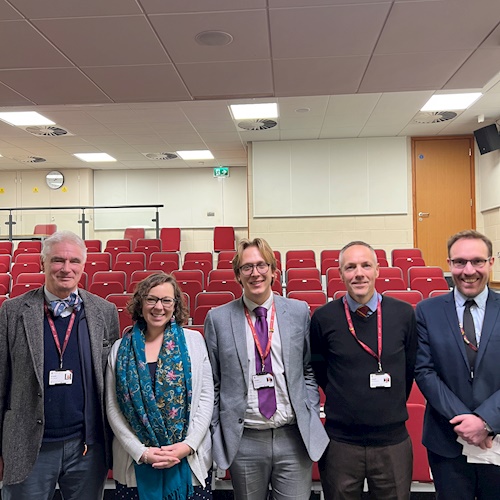
On Thursday 8 December, our Year 9 pupils gathered in the Lecture Theatre for the third and final Question Time of the term. Their host, Mr Player, renowned for his witty and poetic introductions, did not disappoint on this occasion as he introduced the super panel.
First to be introduced was Mr Alcock who is known to be a keen cyclist but, on this occasion, “will he drop the mic or will he be on his bike?” Next was Miss Jones - “will she join the stage and shine or will she fluff her lines?”
Mr Olhausen “knows how to make bread and is always six steps ahead but today is he the boss or will he be a loss?” Last but not least was Mr Burrows, here on the super panel “making his debut for me and for you.”
Diving straight into the questions, Mr Player posed the following to the staff:
Are robot police the way of the future?
Citing a recent example in San Francisco where robot police have been trialled, Mr Player first turned to Mr Burrows who believes it depends, before adding, “they shouldn’t be armed however, even if they are controlled. For me, it puts distance between the shooter and incident.” He then went on to compare the situation to drones and how they are controlled by individuals thousands of miles away from the machine.
Miss Jones was next to answer and vehemently disagreed with the idea of robot police and argued that they are not the solution to policing. She argued that 80% of policing is looking after and protecting civilians and that a robot will not have that ability, adding, “how will a robot, programmed to think in black and white with no emotions, cope when dealing with humans who are driven by emotions that are very much in the grey?”
Mr Alcock was also against the general idea of robot police although was more open to the possibility of their use in surveillance and intelligence gathering. However, just as Miss Jones did earlier, he questioned a robot’s ability to protect, citing a human’s innate sense to do so in comparison to a robot that has been programmed to do the same job.
Mr Olhausen was more open to the idea on the basis that there is a place for technology to assist police and help make decisions and pinpoint issues. However, just as those before him, Mr Olhausen was against the idea of arming robot police, and also cited the example of the distance it would place the shooter away from the incident.
How afraid of Putin should we be?
A highly relevant question, Mr Alcock was first to answer and took the audience on a brief journey through Russia’s history, saying, “to understand Russia and Putin, you need to understand how Russia has developed. It has a different view on Europe to how we do and all Putin sees is Ukraine and Crimea being part of Russia.” He went on to add that the idea of independence (for Ukraine) is a recent idea, but one that doesn’t detract anything from its validity. He concluded by touching on NATO, and that the current situation will escalate if Russia’s neighbouring countries join the organisation.
Mr Olhausen was curious as to whether or not Putin had his finger on the nuclear button. Referring to recent articles, he went on to say that the evidence suggests that Putin will not be the one to start a nuclear war and rather, will wait to use the weapons as a response.
Mr Burrows believes that we should be worried and condemned Putin’s actions saying that they are based on a lack of respect and dignity. Mr Burrows also worries about the psychological damage that has been inflicted on Ukrainians and believes that the West needs to stand up to Putin and not let him continue to take and take like that of a playground bully.
Miss Jones echoed Mr Burrows concerns about those in Ukraine who are directly affected, but disagreed with him on who will be the one to stop Putin. She believes that it will happen internally but is unsure when that will happen, if it even does.
Why do we even have detentions? Do they even work?
In previous editions of Question Time, it has perhaps not been a surprise to the audience that the super panel has more often than not been in favour of detentions. However, today proved to be different.
While the general consensus among the panel was that detentions serve as a way of maintaining general order and harmony, the question of its long-term efficacy was questioned. Mr Olhausen was first to say that the evidence suggests that detentions do not work, especially when pertaining to repeat offenders who are in detention on a weekly basis. Mr Olhausen also suggested that the idea of sitting in a room in silence should not be considered a punishment and to some, could be seen as a welcomed getaway.
Mr Burrows and Miss Jones agreed with the above and also added that while there is a need to have consequences for breaking rules, there needs to be a different solution for repeat offences with the latter suggesting a removal of privileges for other infractions.
Nonetheless, the panel agreed that detentions work in that they promote the need for independence amongst offenders, particularly for those who are in detention for prep. Mr Alcock emphasised that at university and at work, there is a need for self-discipline to get work done and furthermore, the effect of not doing one’s work at that level is much larger. At school, this is shown through poor exam results. At work, it results in potentially losing one’s job.








